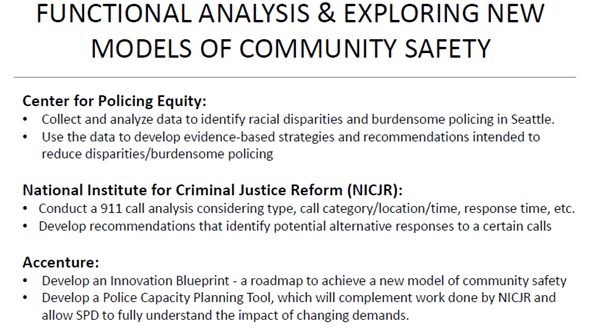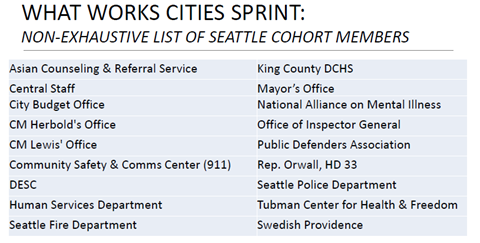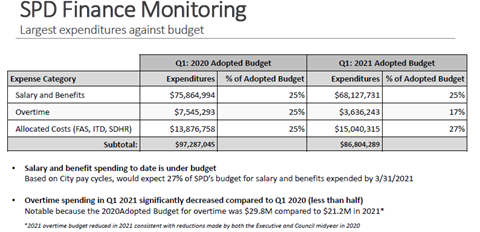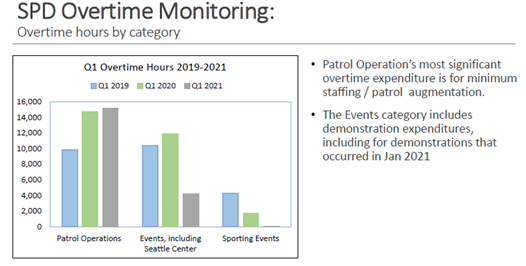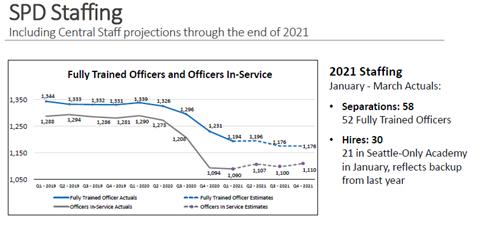Public Safety and Human Services Committee Updates; Lower Bridge: Applications Open for Approved New Users; Federal American Rescue Plan Act Funding is Coming – Public Hearing May 4th; Help Is Available for Sexual Assault Survivors; COVID-19 Updates; Vehicle Travel Times Update; Community Police Commission Dashboard; Riba-Free Financing Survey;
Public Safety and Human Services Committee Updates
The Public Safety and Human Services Committee heard a number of updates earlier this week at the April 27 meeting.
First of all, I invited the Executive to brief the committee about the progress of work to reimagine community safety, and the work of the Interdepartmental Team to implement the Mayor’s “Policing and Community Safety Executive Order to evaluate SPD functions and services and identify areas of SPD response that can be transitioned to civilian or community-based responses.”
The presentation provided updates about investments, transfers of functions such as the Office of Emergency Management, Parking Enforcement Officers (PEOs), and the 911 call center, the Seattle University Public Safety Survey, outreach, exploring new models of community safety, and as part of that, the “What Works Cities Sprint.”
Here’s the timetable that the executive noted:
The presentation focused on Community Investments; Functional Transformation, and Fiscal Transparency, with various subcategories.
A final report is targeted for late May, though the timing depends on when reports from outside partners arrive regarding analysis of SPD functions, which includes potential alternative responses to some calls:
We also heard about the implementation of the new Community Safety and Communication Center also required by the 2021 budget. The new Interim Director, Deputy Chief Chris Lombard, presented. On Monday, the new department accomplished an important milestone when they secured a new Originating Agency Identifier (ORI) number which is required for 911 dispatch to operate. In May, the Council will consider additional legislation in order to transfer the positions and funds from both 911 Dispatch and the Parking Enforcement Officers.
Several city departments, Council offices, and outside agencies are collaborating in the “What Works Cities” Sprint program to explore alternative emergency response models and gun violence prevention. SPD, the Human Services Department, the Fire Department, Mayor’s Office and Council (including myself, my staff, and Councilmember Lewis’ office) are participating:
Other cities are participating in this as well. Here’s the workplan:
The committee also received a quarterly update on SPD finance and staffing. During the 2021 budget process, the Council requested monthly updates on finance, staffing, and the use of overtime, and quarterly updates on 911 response. Council Central Staff is reporting to the committee quarterly to summarize this information.
During the first quarter, SPD has spent under budget:
Overtime use has been lower than during the first quarter of 2020 as compared to last year; when I’ve spoken to Chief Diaz, he has noted he receives daily updates about overtime use.
Use of overtime for events was lower compared to 2019 and 2020; this includes demonstrations. With the COVID pandemic, there have been fewer events this year. The figures for the 2nd quarter in 2020 are higher, after the murder of George Floyd, and resulting demonstrations.
The report notes that SPD staffing is down; the chart shows fully trained officers, and officers in service. More officers than usual have been “out of service” or on leave for a variety of reasons. You can see below that the gap between “fully trained officers (the blue line) and Officers in Service (the green line) narrows as we advance through 2021 because SPD can project that officers out of service are scheduled to return.
This highlights the importance of the work to re-envision public safety; it’s also important to reduce the workload of officers. Dallas Police Chief Brown noted in 2016, “Every societal failure, we put it on the cops to solve. Not enough mental-health funding, let the cop handle it. Not enough drug-addiction funding, let’s give it to the cops,” he said. “Schools fail, give it to the cops. That’s too much to ask. Policing was never meant to solve all those problems. I just ask other parts of our democracy along with the free press to help us.”
As described in my March 26 blog post, Council legislation currently before the Public Safety and Human Services Committee would provide funding for SPD proposals to hire Community Service Officers, crime prevention coordinators, and technology investments to ameliorate the officer shortage.
Median response times in the first quarter by precinct are up from 2020 (except for the North Precinct).
SPD’s standard for Priority 1 calls is 7 minutes, and 15 for Priority 2. SPD noted in a recent presentation that some priority 2 calls have anomalously long times, and may not have been closed out, but they do not eliminate outliers in their data analysis:
The committee also received an update from the new Safe & Thriving Communities Division within the Human Services Department. HSD Community Safety investments are up 87%. The new division was required by the 2021 budget, to elevate and consolidate the department’s investments in safety and violence prevention. This new division has a budget of $32.2 million, including $10 million in new funds allocated by the City Council. This division functions as a funder, a direct service provider, and a convener. Here are some key investments of this new division:
- Critical Incident Community Responders – operated by the nonprofit Community Passageways and developed jointly between HSD and the Seattle Police Department in response to several shootings in early 2020 as a community-based solution to mitigate and prevent shootings.
- The Community Safety Program – supporting violence prevention, intervention, and re-entry supports to foster successful transitions to adulthood and safe communities.
- Gender-Based Violence Services – assisting survivors and those at risk of gender-based violence with community-based services to support and maintain their safety.
- Prevention & Intervention – assisting survivors and those at risk of domestic violence and sexual assault with education and therapeutic services to maintain their safety.
- Support Services – providing services to survivors of domestic violence and sexual assault including shelter, housing, support groups, and legal services.
- Victim Advocacy – providing direct support to survivors through coordination with the Seattle Police Department, legal system navigation, and social services support to maintain their safety.
Because legislation passed in August 2020 transferred the Seattle Police Department’s Victim Advocacy Team to the Human Services Department, the committee discussion included an update on the efforts to transfer these 11 employees and budget to the new Safe and Thriving Communities Division in HSD. This team serves crime survivors of 11 different crime types with expertise in the complex trauma needs of each crime type. Crime Victim Advocates are co-located within SPD Investigative Unit.
There is also a Victim Support Team of more than 60 volunteers to respond on weekends to DV and sexual assault crime scenes at SPD’s request to help provide resources and emergency trauma support.
Lower Bridge: Applications Open for Approved New Users
SDOT has made available applications for use of the Spokane Street (lower) Bridge for new approved user groups. The following user groups can now apply for access to drive on the low bridge:
- On-call medical workers (only for traveling to and from an on-call work shift; employer verification required)
- West Seattle-based restaurants and retail businesses (limited to urgent trips to pick-up equipment or supplies)
- Rideshare vehicles (vans, shuttles or official carpools with a state-issued rideshare license plate; This does not include Uber and Lyft)
- People traveling to and from lifesaving medical treatments (authorization from your medical provider required) via West Seattle; includes driving to treatments via the Fauntleroy Ferry.
The low bridge access request application is available at www.seattle.gov/transportation/lowbridge and in the following languages English, Spanish, Korean, Somali, Chinese (Traditional), Vietnamese, Oromo, and Khmer: English, Español, 繁體中文, 한국어, Tiếng Việt, ភាសាខ្មែរ, Oromiffa, af Soomaali..
If you need language assistance in completing the application or have questions, you can call (206) 400-7511 and leave a voicemail or email WestSeattleBridge@seattle.gov. Provide your name, contact info and language need and someone will return your call.
SDOT notes: This expanded access is on a temporary and limited basis. People must apply, provide their license plate, meet eligibility requirements, and be approved by SDOT before using the low bridge. Beginning April 10, we’ve extending weekend all access hours. Saturdays and Sundays, low bridge is closed to non-authorized vehicles from 8 a.m. to 9 p.m. Weekday restrictions will remain 5 a.m. to 9 p.m.
Applications are processed once per month. Applications must be received by the 15th of the month for access to be granted and begin on the 1st of the following month. Access does not begin immediately after receiving confirmation because license plate information must be processed into the photo enforcement system.
Additional details and background are available the Spokane Street Swing Bridge (Low Bridge) website. Here’s SDOT’s documents re: Frequently Asked Questions, and their Factsheet
Livesaving medical treatment authorization form: English, Español, 繁體中文, af Soomaali, 한국어, Tiếng Việt, Oromiffa, ភាសាខ្មែរ
On-call medical worker form: English, Español, 繁體中文, af Soomaali, 한국어, Tiếng Việt, Oromiffa, ភាសាខ្មែរ
Federal American Rescue Plan Act Funding is Coming; Public Hearing May 4th
You may have heard that the federal government recently passed a $1.9 trillion Covid relief plan, the American Rescue Plan Act (ARPA). You can read more about ARPA here. Seattle expects to receive around $239 million from ARPA in direct, flexible dollars that can address the impacts of the pandemic on Seattle residents and workers. Council will appropriate half the funds now for immediate relief; and the other half this fall for relief in 2022.
In March, Council passed Resolution 31999 in order to outline Council’s spending priorities for federal relief funding expected from ARPA. It calls for investments in homelessness, housing, economic recovery, and community wellness. I advocated to include these priorities:
- Support for seniors experiencing isolation and mental health impacts, and to address barriers for seniors to get vaccinated
- Help for artists and the arts and entertainment sector, who have been hard hit economically
- Small businesses financial assistance, including non-profits
- Addressing diaper need
- Gender-based violence and hate crime prevention, both of which have spiked due to the pandemic
- Assistance to small landlords at risk of losing their affordable rental properties
The next step is to consider specific funding proposals for immediate relief aligned with Resolution 31999. We’ll be doing this work in the Finance & Housing Committee. Councilmember Mosqueda chairs this committee, and I serve as Vice Chair. You can sign up to receive committee agendas – it’s a good way to keep informed about Council’s progress appropriating these funds.
If you have ideas for how Council should invest these funds, mark your calendar for the public hearing on May 4th at 5:30pm. Anyone can sign up to share their ideas and thoughts on ARPA funds. Learn more about participating in the public hearing.
Help Is Available for Sexual Assault Survivors
On Monday, I presented a proclamation signed by Councilmembers and the Mayor declaring April to be Sexual Assault Awareness Month. The proclamation recognized the more than 7,100 King County residents of all ages who received help from organizations in 2020 that serve survivors of sexual assault.
Because many survivors don’t feel they will be believed or supported if they speak out, only about one in four actually do report. Sophia Lee, who accepted the proclamation on behalf of Seattle Women’s Commission, said:
Sexual assault is not only physical abuse, but mental and emotional abuse as well. We need to believe in survivors and support them. It is our actions and culture that allow sexual assault to be so pervasive. We can all do better.
We can change this — and ensure survivors get the support they need — by ending the silence about sexual assault. We can also take steps to change beliefs, attitudes, and behaviors about sexual violence to stop it before it occurs. When parents/caregivers start conversations with the young people in their lives about healthy communications, bodily autonomy, respect, and how to practice consent in everyday interactions, they are taking big steps that protect their child. As Lesbia Orellana from Consejo Counseling & Referral Service said:
Healing and recovery are possible. Ending sexual violence is possible. And everyone has their role to play.
Help is available for anyone who has experienced sexual abuse or needs information. The nonprofit King County Sexual Assault Resource Center (KCSARC) operates a 24-hour Resource Line, at 1-888-99-VOICE, and offers a wealth of resources to help prevent and end sexual violence on its website in both English and Spanish, www.kcsarc.org.
Para ayuda en español, llama al 1.425.282.0324 – atención al cliente en el programa Dando Voz – lunes a viernes de 8am a 5pm.
Special thanks to Tana Yasu and Sophia Lee of Seattle Women’s Commission, Laurel Redden of King County Sexual Assault Resource Center, and Lesbia Orellana of Consejo Counseling & Referral Service for their work on the proclamation, and their support for survivors of sexual assault.
COVID-19 Updates: 14,000 Vaccine Doses Available; What You Can Do Once Vaccinated; Fourth Wave
If you are vaccine-eligible but haven’t yet received your first dose, now’s your moment! This week the City of Seattle received 52,000 doses – three times the amount it had previously received. That means you can now book your vaccination appointment at the West Seattle site directly. More than 14,000 appointments are available right now at the West Seattle, Rainier Beach, and Lumen Field sites.
Anyone 60+ looking for their first dose can just show up at the West Seattle site (2801 SW Thistle Street) without an appointment, Monday through Saturday, 9am to 4pm. You can even bring a younger friend or neighbor (over age 16) to receive their first dose without an appointment, too.
If you got your first dose out of town, you can now get your second dose at the West Seattle or Rainier Beach sites. Click here to schedule your 2nd dose.
While there is much good news on the vaccination front, COVID-19 cases and hospitalizations continue to rise steeply. Public Health – Seattle & King County reports: “The fourth wave of COVID-19 is here and we’re seeing more and more young people suffer from severe disease. Check out this Seattle Times article for more information.”
This week, the federal Centers for Disease Control announced new guidelines on activities once you’re fully vaccinated – that’s two weeks after your final shot.
Vehicle Travel Times Update
Traffic on the South Park Bridge, Roxbury at 15th Ave SW is well above the February 2020 baseline before the arrival of the COVID pandemic in Seattle, and the closure of the West Seattle Bridge. Traffic on Highland Park Way at West Marginal is 169% of the pre-closure. Travel times on West Marginal during the morning and evening rush hours are taking around twice as long as the February 2020 baseline:
Community Police Commission Recommendations Dashboard Now Online
The Community Police Commission (CPC) announced the release of its Police Accountability Recommendation Tracker (PART).
This new dashboard will track not only the recommendations made by the CPC, the Office of Police Accountability, and the Office of the Inspector General, but also whether SPD has implemented those recommendations.
- Click here to go to the tracker.
- Click here to view the video tutorial for the tracker.
- Click here to view the blog announcement of the tracker.
Here’s information from the CPC in their news release:
- The CPC, OIG, and OPA have made a total of 183 recommendations to SPD
- SPD concurred with 120 of those recommendation (66%)
- Only 61 of those of those combined recommendations have been fully implemented or reported as implemented (33%)
- The CPC specifically has made 44 recommendations to SPD
- SPD has concurred with just 15 of the CPC’s recommendations (34%)
- Only 5 of those have been fully implemented or reported as implemented (11%)
Riba-Free Financing Survey
The Muslim Community Finance Coalition (MCFC) wants to improve access to riba-free (interest free) financing options. If you are a Muslim business owner or know someone who is, MCFC wants to hear from you! Learn more and fill out three-minute survey.
Posted: May 1st, 2021 under Councilmember Herbold, COVID-19, Education, Homelessness, Human Services, Office of Police Accountability, Police Department, Proclamations, Public Health, Transportation
Tags: 911 Call Center, American Rescue Plan Act, ARPA, Community Police Commission, COVID-19, Fire Department, HSD, KCSARC, Lower Bridge, Parking Enforcement Officers, PEOs, police, Proclamation, Public Hearing, Rainer Beach, Riba-Free Financing, SDOT, Sexual Assault Awareness Month, Sexual Assault Survivors, SPD, Spokane Street Bridge, Vaccination, Victim Advocacy Team, West Seattle



